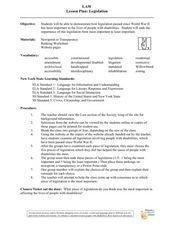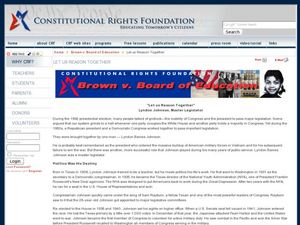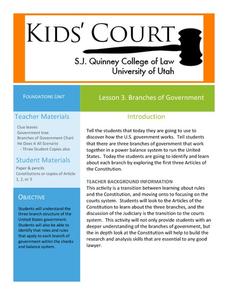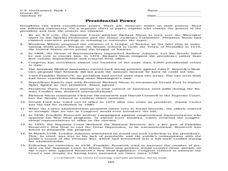American Bar Association
What Is Separation of Powers?
Who has the power? Scholars investigate the creation of the three branches of government in the United States Constitution. They analyze just why the framers created the branches the way they did.
National Endowment for the Humanities
Lesson 4 James Madison: Internal Improvements Balancing Act—Federal/State and Executive/Legislative
Who has the power? The founding fathers asked the same question when the United States was formed. Learners explore issues that arose during Madison’s presidency that raised constitutional questions. Through discovery, discussion, and...
Youth Outreach
Connecting the Separate Powers
Scholars demonstrate what they know about the separation of powers through role play. Two individuals act out a skit as the remaining class members discuss and decide whether the interaction they observed is an appropriate example...
C-SPAN
Choice Board: Expressed and Implied Powers
Article 1, Section 8 of the United States Constitution expressly lists powers given to Congress. Over the years, lawmakers have expanded the enumerated powers to include powers implied by the list. To better understand the significance...
Curated OER
War Making: Executive and Legislative Powers
Students examine executive and legislative powers. In this federal powers lesson plan, students determine who has the power to wage war in the U.S. government. Students analyze the Constitution and research historical precedents...
Curated OER
Legislation
Students rank the legislation of disabilities since World War I and write their rationale for the ranking. In this legislation of disabilities lesson plan, students do this for 5 legislations that have been passed.
Curated OER
"Let us Reason Together" Lyndon Johnson, Master Legislator
Students explore the contributions of Lyndon B. Johnson. For this congress lesson, students listen to their instructor lecture on the prowess of Lyndon B. Johnson's legislative skills. Students respond to discussion questions connected...
Curated OER
The Role of the Judiciary in a System of Separation of Powers and Checks and Balances
High schoolers review concepts shown to them in a telecast on the role of the judiciary in a system of separation of powers. After reading an article, they work together in groups to complete a chart on checks and balances. They also...
Curated OER
Leaders & Leadership: A Political Power Structure from Washington to West KY
Though outdated (the presentation names members of the Bush Administration as current political leaders), these slides could be useful to an industrious teacher who is willing to update the information in the Executive, Judicial, and...
Curated OER
President Bush Balances Power
Students review the results of the November 2006 mid-term election. Using their text, they read the history of the balance of power and examine recent news articles. They present their findings to the class and may even hold a debate.
Curated OER
Government: Balance of Power
Fifth graders conduct Internet research about the governmental balance of power. They create Kidspiration projects demonstrating the workings of the three branches of government. They compare U.S. democracy with other forms of government.
Curated OER
Lesson 3: Branches of Government
Young historians climb through the three branches of the US government in the third lesson of this five-part series. While reading the first three Articles of the Constitution in small groups, children write facts on paper leaves...
Curated OER
The Role of the Judiciary in a System of Separation of Powers and Checks and Balances
Students determine the role of each branch of government in a system of checks and balances. They demonstrate the role of the judiciary in American government
National Constitution Center
Separation of Powers
Learners explore how the Constitution provides for separation of power and limited government, as evidenced by the three branches of government. They participate in role-playing situations, group discussions, and complete worksheets to...
Curated OER
Regents Review Worksheet #1: Principles of the U.S. Constitution
Kids who take the Regents Exam really need to know a lot of information. This is a wonderful exam review tool that includes 26 pages of questions, charts, and suggested readings to help upper graders pass the test. It focuses on all...
Heritage Foundation
Congress's Territorial Powers, Implied Powers, Citizenship, and the Bureaucracy
An informative resource gives scholars a look into why the US Constitution placed certain federal powers over that of the state. A variety of activities about constitutional clauses helps to create meaningful learning.
Curated OER
Separation of Powers
Students examine the separation of powers in local and federal government. Using case studies, they review several instances of separation of powers. After reading the case studies, they write a brief opinion essays supporting their...
Curated OER
Separation of Powers Between the Three Branches of
Pupils investigate the concept of the three branches of government by dividing into three teams. They record the powers of the three branches.
iCivics
Congress
Through reading materials, worksheets, and a primary source activity, this resource provides an overview of the structure and powers of the legislative branch of government in the United States. Readings review how a bill becomes a law,...
iCivics
Separation of Powers
In a fun and informative simulation, your learners will act in groups as lead chefs, menu writers, and nutrition inspectors in deciding a new school lunch menu. They will then compare and contrast their experience to the interaction...
Constitutional Rights Foundation
Educating About Immigration The DREAM Act
Group members role play state legislators, supporters of and opponents to the The DREAM Act (Development, Relief, and Education for Alien Minors). After listening to the arguments put forth for and against the immigration...
Curated OER
Checks on Presidential Power
Students examine presidential powers. In this checks and balances lesson, students identify the constitutional and informal restraints of the president and consider the reasons for the limitations.
Curated OER
Separation of Powers: Checks and Balances
Students discuss the reasons for separation of powers between the branches of government. They list the branches and identify the powers and functions of each.
Curated OER
How Can the President Influence Legislation?
Students examine presidential powers. In this Executive Branch lesson plan, students listen to their instructor present a lecture on the president's influence on legislation as they view a 7-slide PowerPoint presentation.























